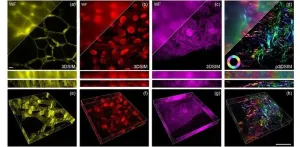(Press-News.org) Processing times for complaints against drug companies suspected of having breached their industry code of practice have more than tripled in a nearly two-decade period, an investigation by The BMJ has found.
Data analysis by Shai Mulinari at Lund University and Piotr Ozieranski at the University of Bath show that the average processing time of a complaint more than tripled between 2004-2021, from less than three months to more than 8.5 months. Numerous complaints have taken more than a year to resolve.
The industry’s trade body, the Association of the British Pharmaceutical Industry (ABPI), has now raised fees related to these complaints by more than 40% in order to tackle the backlog.
Complaints against ABPI members and non-members that have ratified the ABPI code of practice are dealt with by the arms-length body, The Prescription Medicines Code of Practice Authority (PMCPA), the authors explain. For example, Novo Nordisk, the Danish drug giant, is currently suspended from the ABPI until 2025 for sponsoring weight loss programmes that promoted its products.
Commenting on the delays, Susan Bewley, former chair of HealthSense-UK, said: ‘"Matters have gone adrift over the past two decades if it now takes over three times as long to process complaints. It's a privilege for an industrial sector to have 'light-touch' self-regulation and … mark their own homework.”
In correspondence seen by The BMJ, an ABPI executive said the hike in the charges would ‘partly’ support the PMCPA to reduce long processing times.
“In recent years, there has been an increase in both the number and complexity of complaints, which has unfortunately caused some cases to take longer to resolve than we want,” said Alex Fell, director of the PMCPA. “Addressing this is our highest priority”, he added.
Critics have questioned whether the PMCPA’s remit is adequate to meet the current scale of challenges posed by unethical pharmaceutical marketing.
Since 2019, the PMCPA has adjudicated against Novo Nordisk several times for undue marketing of its weight-loss drug Saxenda. This did not serve as a deterrent, as Novo Nordisk went on to engage in serious breaches in 2021 and 2022.
Novo Nordisk takes “any breach of the ABPI Code extremely seriously,” a company spokesperson told The BMJ. “Since the suspension, we have continued to strengthen our compliance framework to ensure that we are meeting the standards required by the Code, and our progress is being monitored through PMCPA audits.”
But Margaret McCartney, honorary senior lecturer at University of St Andrews, questioned whether the sanctions delivered under the current system improve compliance. The charges are “nothing to massive companies” and reputational damage hasn’t, for example, prevented NHS’s decision to allow Novo Nordisk to fund obesity clinics, she said.
Alan Black, a retired pharmaceutical industry senior doctor said he has noticed a deterioration in processing times. He shared his concerns with the ABPI, the PMCPA, and the Medicines and Healthcare products Regulatory Agency (MHRA) which has statutory responsibility to oversee the self-regulation system.
Yet the correspondence between Black and the MHRA reviewed by The BMJ shows that the MHRA has no expectations for the duration of handling of complaints by PMCPA. “If self-regulation fails, the MHRA will act to ensure a company is fully compliant with UK medicines law to ensure that safety is not compromised”, a MHRA press officer told The BMJ, without specifying how the agency would determine this to be the case.
“Processing times have been clearly deteriorating for the best part of a decade yet neither the MHRA or the ABPI appears to have been sufficiently concerned to do anything about it,” said Black. “The current time to deal with any complaint now appears to be over a year, a delay which risks seriously undermining public confidence in the independence and utility of the entire self-regulatory system,” he added.
[Ends]
END
The BMJ reveals huge delays in dealing with complaints against UK drug companies
Delays allow problematic practices to carry on for many months
2024-02-15
ELSE PRESS RELEASES FROM THIS DATE:
School uniform policies linked to students getting less exercise, study finds
2024-02-15
School uniform policies could be restricting young people from being active, particularly primary school-aged girls, new research suggests.
The University of Cambridge study used data about the physical activity participation of more than a million five-to-17-year-olds internationally. It found that in countries where a majority of schools require students to wear uniforms fewer young people tend to meet the 60 minutes of physical activity per day recommended by the World Health Organisation (WHO).
Regardless of uniform policies, across most countries fewer girls than boys reach those ...
Scientists are unravelling the secrets of red and grey squirrel competition
2024-02-15
In a first of its kind study, researchers have identified significant differences between the diversity of gut bacteria in grey squirrels compared to red squirrels which could hold the key to further understanding the ability of grey squirrels to outcompete red squirrels in the UK.
New research, published in the Journal of Medical Microbiology, looked to understand more about the mechanisms by which grey squirrels are able to gain an advantage over red squirrels. Chris Nichols, Conservation Evidence ...
Targeting the microenvironment rather than a specific cell type could be the key to healing injured hearts
2024-02-15
A groundbreaking scientific study published in Nature Cardiovascular Research has unveiled a remarkable discovery that may have far-reaching implications for the treatment of heart disease.
The intensive investigations utilizing single-cell genomics and genetic experiments were conducted by a team of renowned scientists in the Cardiomyocyte Renewal Laboratory and McGill Gene Editing Laboratory at The Texas Heart Institute, including James F. Martin Vivian L. Smith Chair in Regenerative Medicine and Vice Chairman and Professor ...
Live from the brain: Visual cues inform decision to cooperate
2024-02-14
HOUSTON – (Feb. 14, 2024) – Eye contact and body language are critical in social interaction, but exactly how the brain uses this information in order to inform behavior in real time is not well understood.
By combining behavioral and wireless eye tracking and neural monitoring, a team of Rice University scientists and collaborators studied how pairs of freely moving macaques interacting in a naturalistic setting use visual cues to guide complex, goal-oriented cooperative behavior. The study published in Nature offers first evidence that the part of the brain that processes visual information ⎯ the visual cortex ⎯ plays an active role in social behavior by providing ...
Super-resolution microscopy harnesses digital display technology
2024-02-14
In the ever-evolving realm of microscopy, recent years have witnessed remarkable strides in both hardware and algorithms, propelling our ability to explore the infinitesimal wonders of life. However, the journey towards three-dimensional structured illumination microscopy (3DSIM) has been hampered by challenges arising from the speed and intricacy of polarization modulation.
Introducing the DMD-3DSIM System
Enter the high-speed modulation 3DSIM system “DMD-3DSIM,” combining digital display with super-resolution imaging, allowing scientists to see cellular structures in unprecedented detail. As ...
UW anthropologists’ research unveils early stone plaza in the Andes
2024-02-14
Two University of Wyoming anthropology professors have discovered one of the earliest circular plazas in Andean South America, showcasing monumental megalithic architecture, which refers to construction that uses large stones placed upright with no mortar.
Located at the Callacpuma archaeological site in the Cajamarca Basin of northern Peru, the plaza is built with large, vertically placed megalithic stones -- a construction method previously unseen in the Andes. Associate Professor Jason Toohey, project lead, and Professor Melissa Murphy have been researching ...
New epigenetic clocks reinvent how we measure age
2024-02-14
BOSTON – What causes us to age? New “clocks” developed by researchers may help point to the answers. Investigators from Brigham and Women’s Hospital, a founding member of the Mass General Brigham healthcare system, unveil a new form of epigenetic clock – a machine learning model designed to predict biological age from DNA structure. The novel model distinguishes between genetic differences that slow and accelerate aging, predicts biological age and evaluates anti-aging ...
The roles of USP1 in Ewing sarcoma
2024-02-14
“This study uncovered important roles for USP1 in Ewing sarcoma.”
BUFFALO, NY- February 14, 2024 – A new research paper was published in Genes & Cancer on February 5, 2024, entitled, “Roles of USP1 in Ewing sarcoma.”
Ewing sarcoma is a cancer of bone and soft tissue in children and young adults that is driven by the EWS-ETS fusion transcription factor, most commonly EWS-FLI1.
Researchers Panneerselvam Jayabal, Xiuye Ma and Yuzuru Shiio from The University of Texas Health Science Center previously reported that Ewing sarcoma harbors two populations of cells, ...
New algorithm disentangles intrinsic brain patterns from sensory inputs
2024-02-14
Maryam Shanechi, Dean’s Professor of Electrical and Computer Engineering and founding director of the USC Center for Neurotechnology, and her team have developed a new machine learning method that reveals surprisingly consistent intrinsic brain patterns across different subjects by disentangling these patterns from the effect of visual inputs.The work has been published in the Proceedings of the National Academy of Sciences (PNAS).
When performing various everyday movement behaviors, such as reaching for a book, our brain has to take in information, often in the form of visual input — for example, seeing where the book is. Our brain then has to process ...
A new test could predict how heart attack patients will respond to mechanical pumps
2024-02-14
Every year, around 50,000 people in the United States experience cardiogenic shock — a life-threatening condition, usually caused by a severe heart attack, in which the heart can’t pump enough blood for the body’s needs.
Many of these patients end up receiving help from a mechanical pump that can temporarily help the heart pump blood until it recovers enough to function on its own. However, in nearly half of these patients, the extra help leads to an imbalance between the left and right ventricles, which can pose danger to the patient.
In a ...
LAST 30 PRESS RELEASES:
Scientists discover “bacterial constipation,” a new disease caused by gut-drying bacteria
DGIST identifies “magic blueprint” for converting carbon dioxide into resources through atom-level catalyst design
COVID-19 vaccination during pregnancy may help prevent preeclampsia
Menopausal hormone therapy not linked to increased risk of death
Chronic shortage of family doctors in England, reveals BMJ analysis
Booster jabs reduce the risks of COVID-19 deaths, study finds
Screening increases survival rate for stage IV breast cancer by 60%
ACC announces inaugural fellow for the Thad and Gerry Waites Rural Cardiovascular Research Fellowship
University of Oklahoma researchers develop durable hybrid materials for faster radiation detection
Medicaid disenrollment spikes at age 19, study finds
Turning agricultural waste into advanced materials: Review highlights how torrefaction could power a sustainable carbon future
New study warns emerging pollutants in livestock and aquaculture waste may threaten ecosystems and public health
Integrated rice–aquatic farming systems may hold the key to smarter nitrogen use and lower agricultural emissions
Hope for global banana farming in genetic discovery
Mirror image pheromones help beetles swipe right
Prenatal lead exposure related to worse cognitive function in adults
Research alert: Understanding substance use across the full spectrum of sexual identity
Pekingese, Shih Tzu and Staffordshire Bull Terrier among twelve dog breeds at risk of serious breathing condition
Selected dog breeds with most breathing trouble identified in new study
Interplay of class and gender may influence social judgments differently between cultures
Pollen counts can be predicted by machine learning models using meteorological data with more than 80% accuracy even a week ahead, for both grass and birch tree pollen, which could be key in effective
Rewriting our understanding of early hominin dispersal to Eurasia
Rising simultaneous wildfire risk compromises international firefighting efforts
Honey bee "dance floors" can be accurately located with a new method, mapping where in the hive forager bees perform waggle dances to signal the location of pollen and nectar for their nestmates
Exercise and nutritional drinks can reduce the need for care in dementia
Michelson Medical Research Foundation awards $750,000 to rising immunology leaders
SfN announces Early Career Policy Ambassadors Class of 2026
Spiritual practices strongly associated with reduced risk for hazardous alcohol and drug use
Novel vaccine protects against C. diff disease and recurrence
An “electrical” circadian clock balances growth between shoots and roots
[Press-News.org] The BMJ reveals huge delays in dealing with complaints against UK drug companiesDelays allow problematic practices to carry on for many months




